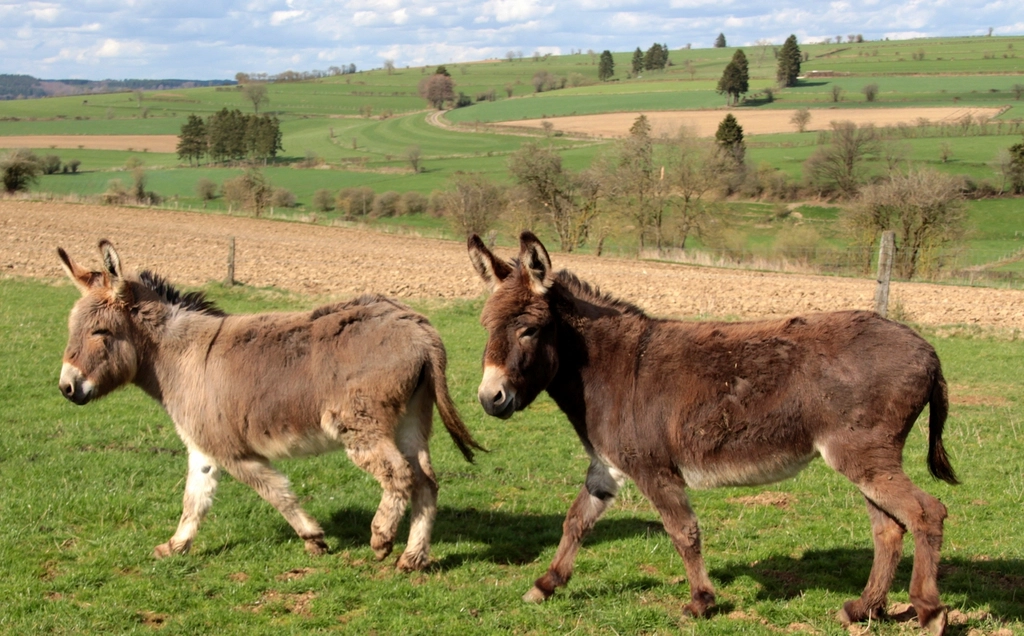It’s easy to overlook the quiet, unassuming donkey—until you realize just how much these remarkable animals have shaped human history. For centuries, donkeys have carried more than just burdens; they’ve borne the weight of entire civilizations on their sturdy backs. Yet, despite their importance, donkeys are often dismissed as stubborn or simple-minded. On World Donkey Day, it’s time to turn the spotlight onto these unsung heroes and explore the science that proves donkeys are so much more than their reputation. What if everything you thought you knew about donkeys was wrong?
The Misunderstood Genius of Donkey Intelligence
Donkeys are often unfairly labeled as stubborn, but science tells a very different story. Researchers have found that, unlike horses, donkeys use a cautious approach when faced with new situations. This isn’t stubbornness—it’s self-preservation rooted in intelligence. Donkeys remember routes for years, recognize individual humans, and can figure out complicated puzzles. Animal cognition studies have shown that donkeys possess remarkable problem-solving skills, often outperforming horses when it comes to memory and navigating tricky environments.
Physical Strength and Endurance: The True Workhorses
While horses are celebrated for their speed and beauty, donkeys are the true champions of endurance. Anatomically, their strong hooves and muscular bodies allow them to carry loads over rocky, unforgiving terrain that would leave other animals exhausted. In many parts of the world, donkeys are still the backbone of rural transportation, hauling water, firewood, and food across mountains and deserts. Their ability to thrive where other animals struggle is a testament to their incredible physical adaptation.
Donkey Communication: A Language of Subtlety

Donkeys may not neigh dramatically like horses, but their communication is rich and complex. They use a variety of vocalizations, from gentle brays to low rumbles, to convey emotions and warn of danger. Scientists studying donkey herds have discovered that these animals communicate through ear positions, facial expressions, and even the way they stand. Their subtle social cues foster strong bonds within groups and help them navigate social hierarchies with surprising grace.
Emotional Intelligence: Forming Deep Connections

Recent research has shown that donkeys are deeply emotional animals. They form lifelong friendships and often show signs of distress when separated from companions. People who work closely with donkeys describe their affectionate nuzzles and calming presence, particularly with children or individuals in need of comfort. In therapy programs, donkeys have been used to help humans cope with trauma, anxiety, and grief, demonstrating their unique empathetic abilities.
Adaptability to Harsh Environments
Donkeys evolved in some of the harshest environments on earth, and their bodies reflect remarkable adaptations. Their coats protect them from extreme temperatures, and their digestive systems extract maximum nutrition from poor-quality forage. In places like the Middle East and Africa, donkeys survive where even camels may fail. This resilience has made them indispensable partners in regions facing drought, food insecurity, or climate change.
Guardians of Biodiversity

In many rural ecosystems, donkeys play a crucial role in maintaining biodiversity. Their grazing patterns prevent the overgrowth of invasive plants and help maintain open landscapes that support native wildlife. By spreading seeds through their droppings, they contribute to plant diversity and soil health. Conservationists are now recognizing donkeys as important allies in the fight to protect fragile habitats and promote ecological balance.
Myth-Busting: Debunking Donkey Stereotypes

The stubborn donkey is a myth that refuses to die, but science keeps proving it wrong. Donkeys are careful thinkers—they pause to assess danger rather than bolt blindly. This caution is often misread as obstinacy. In reality, donkeys make calculated decisions to ensure their safety and the safety of their herd. Studies have shown that donkeys can be trained to perform complex tasks and respond to human cues, disproving the idea that they are slow learners.
Donkeys in Human History: Unsung Heroes

From ancient Egypt to modern farms, donkeys have played a pivotal role in human progress. They powered trade routes like the Silk Road, carried supplies in wars, and helped build cities. In many cultures, donkeys are symbols of humility, patience, and hard work. Their contributions are woven into the fabric of daily life, yet their stories are rarely told. Recognizing their legacy is a crucial step toward giving donkeys the respect they deserve.
Scientific Advances in Donkey Health and Welfare

Veterinary science has made significant strides in understanding donkey health. Unlike horses, donkeys are prone to hiding pain, which can lead to underdiagnosis of illness. New research has led to better pain management, nutrition guidelines, and preventive care. Animal welfare organizations are working to educate communities about the unique needs of donkeys, ensuring they receive the care and compassion they need to thrive.
Celebrating World Donkey Day: A Call for Change

World Donkey Day isn’t just about appreciating donkeys—it’s about advocating for their protection and welfare. Across the globe, millions of donkeys still face neglect, overwork, and mistreatment. Science-backed awareness campaigns are helping to shift attitudes, encouraging better treatment and respect for these remarkable animals. Celebrating donkeys means championing their rights and recognizing their invaluable contributions to our world.
Looking to the Future: The Role of Donkeys in a Changing World

As the world faces new challenges, from climate change to food insecurity, donkeys are more important than ever. Their resilience, intelligence, and adaptability make them vital partners in sustainable agriculture and community development. Scientists and animal advocates alike are calling for more research, better policies, and a global shift in perception. Imagine a future where donkeys are celebrated not just on World Donkey Day, but every day, for the extraordinary animals they truly are.
Donkeys have quietly shaped the course of human civilization, all while asking for little in return. Their intelligence, strength, and emotional depth reveal a creature worthy of admiration and respect. As we celebrate World Donkey Day, let’s challenge old stereotypes and open our eyes to the science that tells a different story. Isn’t it time we gave these humble heroes the recognition they’ve always deserved?



